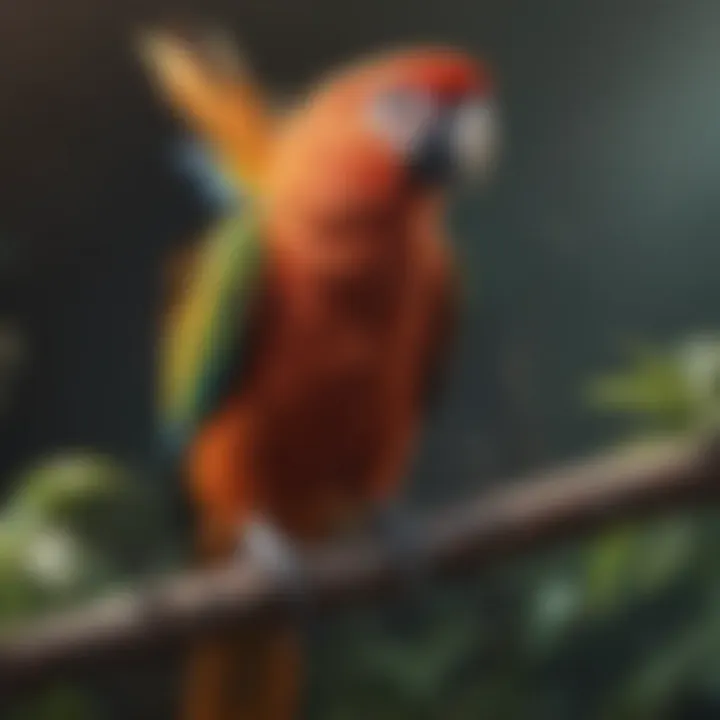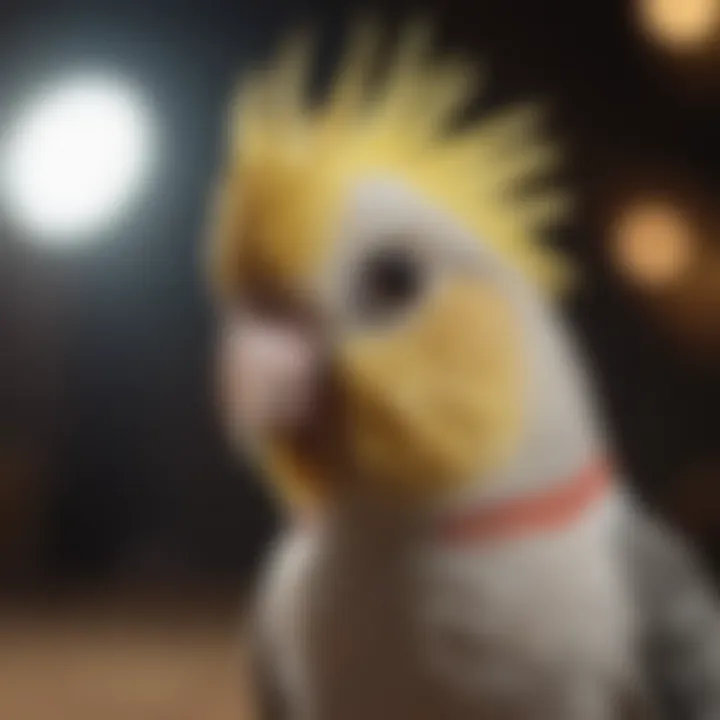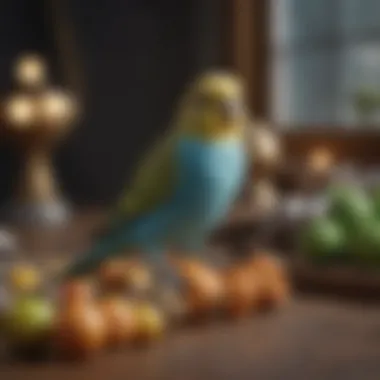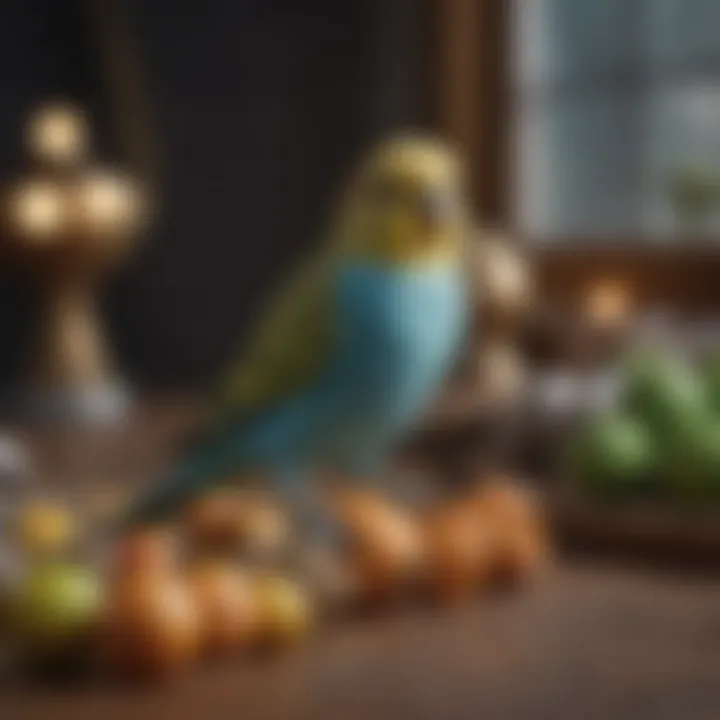Choosing the Right Bird as a Pet: Key Considerations


Intro
Choosing a bird as a pet can be an enriching experience, but it also requires a good deal of thought. Various species have distinct characteristics, behavioral traits, and care requirements that one must consider carefully before making a decision. Understanding these factors is not merely beneficial; it's essential for ensuring the health and happiness of your future avian companion.
This article aims to shed light on critical considerations when selecting a bird as a pet. By delving into the behavioral, care, training, health, and enrichment aspects related to pet birds, prospective owners will gain comprehensive insights. These insights will help them align their lifestyle with the needs of specific bird species, ultimately enhancing the quality of life for both the owners and their feathered friends.
Understanding Your Pet
Birds are unique creatures with various behavior patterns and needs. To choose the right companion, one must first understand these foundational elements.
Pet Behavior Basics
Birds exhibit a wide array of behaviors influenced by their species, environment, and interactions with humans. Recognizing signs of contentment or stress in a bird can significantly impact the quality of the relationship.
Common behaviors include vocalizations, preening, and foraging, which indicate how a bird expresses itself and interacts with its surroundings. Observing these behaviors allows potential owners to determine which species aligns with their expectations and lifestyle.
Common Breed Characteristics
Different bird breeds possess unique characteristics. For instance, Parakeets are often lively and social, while Cockatoos tend to form strong bonds with their owners. Understanding these traits can guide your choice.
Some of the commonly kept bird species and their notable characteristics include:
- Budgerigar (Parakeet): Small, social, and colorful; known for mimicking sounds.
- African Grey Parrot: Highly intelligent; can develop a substantial vocabulary.
- Canary: Generally less interactive; prized for their singing and bright colors.
- Cockatiel: Friendly and affectionate; can be very playful.
Evaluating these characteristics can make a significant difference in ensuring compatibility.
Species-Specific Needs
Every species comes with its specific requirements for care, space, and social interaction. For example, some birds need more flight space, while others might be more content in a smaller area but require ample social engagement.
It is crucial to research the following for each potential bird species:
- Housing size and setup
- Diet and nutritional needs
- Social interaction requirements
Fulfilling a bird's species-specific needs is vital in creating a harmonious living situation.
Pet Care and Maintenance
Caring for a pet bird involves more than simply providing food and water. A comprehensive understanding of maintenance is needed to ensure optimal health and happiness.
Feeding Guidelines
A well-balanced diet is essential. Most birds benefit from a combination of seeds, pellets, fresh fruits, and vegetables. Understanding the dietary needs of your chosen species will ensure proper nutrition and energy levels.
For instance:
- Budgerigars: Require a varied diet that includes seeds, pellets, and fresh greens.
- African Grey Parrots: Need a diet rich in fruits and vegetables, as well as pellets designed for larger birds.
Grooming Essentials
Regular grooming is crucial. Birds often require nail trims, beak care, and feather maintenance. Neglecting these can lead to health complications.
- Nail Trimming: Should be performed every few weeks to prevent overgrowth.
- Feather Care: Bathing can help maintain feather quality.
Hygiene Practices
Cleanliness in the bird's living environment is paramount. This includes regular cleaning of cages, perches, and toys. It prevents the buildup of harmful bacteria and parasites, safeguarding both the bird's health and your home environment.
Training and Development
Training your bird can significantly enhance communication and bonding.
Basic Commands and Skills
Introducing basic commands like
Understanding Avian Companionship
Understanding the relationship between humans and birds is crucial for anyone considering a feathered companion. Birds are unique pets. They have distinct behaviors, social needs, and care requirements. A solid understanding of these elements helps prospective owners make informed choices and fosters a stronger bond between them and their birds.
The companionship that birds offer can be profound. They can provide comfort, entertainment, and even emotional support. Careful consideration of their needs leads to a fulfilling experience for both the owner and the avian friend. This article will explore the various aspects of keeping birds as pets, ensuring that potential owners grasp the nuances involved.
The Appeal of Birds as Pets


Birds have an undeniable charm. Their vibrant colors and lively movements capture attention. They can be quite intelligent, capable of forming strong bonds with their owners. Unlike traditional pets like dogs or cats, birds offer a different experience. Many people appreciate the uniqueness of caring for a bird. They often require less space and, depending on the species, can be relatively low-maintenance, making them appealing to a wide range of pet owners.
The sounds they make also hold attraction. From soft chirps to melodious songs, birds can brighten up a household. For some, this auditory experience is a substantial part of why they choose birds. Furthermore, the social aspect allows for interactive play and communication, enhancing the connection between the bird and its owner.
Different Types of Pet Birds
Birds come in a variety of species. Understanding the characteristics of each is important for choosing the right one. Each species offers different experiences and challenges, influencing the overall relationship with the pet.
Parrots
Parrots stand out for their intelligence and numerous vocal abilities. They can mimic human speech, which appeals to many potential owners. Their playful and engaging nature makes them a popular choice. However, their social needs require more interaction and commitment than some other species.
One unique feature of parrots is their ability to form deep connections, often attaching significantly to their owners. However, this also means they can experience separation anxiety if left alone for extended periods, which could lead to behavioral issues.
Canaries
Canaries are beautiful songbirds known for their melodious singing. they are relatively low-maintenance and require smaller spaces compared to larger birds. Their soothing songs can create a peaceful atmosphere in the home.
One consideration with canaries is their gender. Male canaries typically sing more than females, which might influence owner preferences. They are social birds but can thrive individually, making them ideal for those who may not be ready for the interactive demands of other bird species.
Finches
Finches are small, colorful, and often found in flocks in the wild. Their lively nature and soft chirps make them delightful companions. They are independent birds, needing less human interaction, which can be ideal for busy owners.
The downside is that finches typically do not enjoy being handled. They are better appreciated as a visually engaging pet rather than one that interacts closely with humans. Thus, they suit individuals who appreciate beauty without requiring extensive companionship.
Doves
Doves are often regarded as symbols of peace. They are social creatures that thrive in pairs. Their gentle demeanor makes them approachable and suitable for families. The calming cooing sounds they produce can provide a soothing ambiance.
Textured feathers and a soft appearance make doves appealing visually. But they require companionship and do best in pairs. Therefore, potential owners must consider the commitment involved.
Budgerigars
Budgerigars, commonly known as budgies, are one of the most popular pet birds. They are sociable, playful, and often develop strong bonds with their owners. Budgies can learn to speak and perform tricks, adding an interactive element to pet ownership.
Their small size and colorful feathers contribute to their appeal. However, they do require social interaction to remain happy and healthy, which might be a consideration for prospective owners. Understanding their needs can enhance the experience of having a budgie as a pet.
Factors to Consider Before Selection
Choosing a bird as a pet is not a decision to take lightly. It involves several important factors that can significantly impact both the owner and the bird's life. Understanding these factors can help potential bird owners make informed choices that align with their daily routines, living situations, and personal preferences.
When considering factors before selection, it is essential to take into account space, time, and lifestyle. Each aspect contributes to the well-being of the pet bird. A mismatched environment can lead to stress for the bird, resulting in behavioral issues, health complications, or a less satisfying companionship experience.
Space Requirements
Space is a crucial consideration when selecting a pet bird. Different species have distinct requirements regarding cage sizes and the amount of room to move around. Larger birds, such as parrots, need spacious cages that allow for flying or climbing. For instance, a large parrot requires at least a 24-inch by 24-inch cage to accommodate its size and activity level. In contrast, smaller birds like finches or canaries may thrive in less expansive environments but still need adequate space to exercise.
In addition to the cage size, the location and layout of your home should also be considered. Birds require safe areas for out-of-cage time, which helps them stretch their wings. A cluttered living space can lead to safety hazards for birds. Owners should designate a safe play area free from potential dangers, such as electrical cords or open windows. Keeping in mind the layout of your home will ensure that the bird has enough freedom and safety.
Time Commitment
Birds, like any pet, require time and attention. The level of commitment can vary greatly depending on the species. Parrots and larger species, for example, may need several hours of interaction each day. They are highly social creatures and need mental stimulation through play and interaction with their owners.
On the other hand, some smaller birds, like finches, are less demanding but still require daily care and attention. Routine tasks such as feeding, cleaning cages, and socializing should be considered part of your time commitment. Overlooking this aspect can lead to unfufilled birds, which could result in behavioral disorders or health problems.
Lifestyle Compatibility
Lifestyle compatibility is an essential factor when choosing a pet bird. This assessment involves understanding how a bird's habits align or clash with your daily routine. If you have a busy life or frequently travel, consider selecting a bird that requires less attention.
It is also important to note the activity levels of different species. Active birds, like parrots, might not do well in a quiet environment, while calmer species, such as doves, might be better suited for a peaceful home. Additionally, evaluate how family members feel about having a bird. Some birds may not be suitable for families with young children due to their sensitive nature or specific care requirements.
By closely examining these elements, you ensure a harmonious relationship between you and your future feathered companion. Understanding the commitments involved fosters a responsible pet ownership, leading to a more fulfilling experience for both you and your bird.
Remember: The right bird can enhance your life, but a poor match can lead to stress and unhappiness for both you and the pet.
Evaluating Bird Temperament
Understanding a bird’s temperament is crucial for a harmonious pet-owner relationship. Each bird species exhibits unique behaviors and traits that can influence its compatibility with a potential owner’s lifestyle. Evaluating bird temperament helps ensure that both the pet and the owner experience a fulfilling companionship.
Birds are not only beautiful creatures but also have an array of personalities. Observing these traits can inform decisions regarding appropriate species selection. Some birds thrive on social interaction, while others prefer solitude. Recognizing the nuances in their temperament can greatly affect how one manages their care, training, and interaction.
Social Behavior


Pet birds display various social behaviors that reveal their needs and preferences. Some species, like parrots, are extremely social and require frequent interaction. This inherent social nature makes them capable of forming strong bonds with their owners. In contrast, other birds, such as finches, may exhibit more solitary traits, often preferring the company of their own kind rather than direct human interaction.
When considering a bird, the social behavior of the species is paramount. Potential owners must assess whether their household can provide the necessary engagement that active species require. Birds that thrive on social contact might become depressed or develop behavioral issues in the absence of interaction. Therefore, it is vital to match a bird's social needs with the owner’s ability to participate in its life.
Social behaviors of birds can influence their adaptability to domestic life. It is essential to choose a species that aligns with your lifestyle.
Vocalization Patterns
Vocalization is another significant factor in evaluating a bird’s temperament. Each species has its own vocal tendencies, ranging from melodious songs to constant chattering. Some birds, like canaries, are known for their singing, bringing joy and a musical ambiance to a home. On the other hand, certain parrots can produce loud squawks and mimicked phrases, which might not suit every environment.
Understanding a bird’s vocalization patterns will be key to ensuring harmony in the household. If a quiet environment is important, selecting a quieter species, such as doves, may be wise. Points to consider include:
- Potential for noise levels
- Time spent in close quarters with the bird
- Your personal preferences regarding sound
Training Potential
Training potential varies by species, and it plays a major role in determining the overall experience of owning a bird. Certain birds, particularly parrots, display high intelligence, making them well-suited for trained behaviors and tricks. They can learn commands and even mimic human speech, which can be incredibly rewarding for owners seeking interaction.
In contrast, some species may be less responsive to training. Budgerigars, while social and friendly, might not perform complex tricks as easily as a parrot would. Understanding a bird's training potential helps set realistic expectations for prospective owners. To foster a productive training atmosphere, consider the following:
- Start training early, if possible.
- Use positive reinforcement techniques.
- Be patient and consistent; birds may take time to learn.
Evaluating bird temperament is essential for making informed decisions about pet ownership. By paying attention to social behavior, vocalization patterns, and training potential, future bird owners can prepare themselves for the responsibilities and joys of avian companionship.
Nutritional Needs and Care
Understanding Nutritional Needs and Care is critical for any prospective bird owner. This section will delve into the specifics of what your bird needs to thrive. Proper nutrition and care not only support long-term health, but also enhance behavior and longevity.
Dietary Requirements
Birds require a well-balanced diet, which typically consists of seeds, pellets, fruits, and vegetables. Each species has distinct dietary needs, so it is vital to cater to these requirements. For instance, larger parrots often need more fruits and vegetables compared to smaller finches, which may thrive on seeds.
- Commercial Pellets: Many owners choose high-quality pellets as the primary food source. These pellets are specially formulated to provide essential nutrients that seeds may lack.
- Fresh Fruits and Vegetables: Items such as kale, carrots, apples, and berries should be included regularly. These foods offer vitamins and minerals that support the bird’s immune system and overall health.
- Seeds and Grains: While seeds can be included in a bird's diet, they should not be the only item. High-fat seeds can lead to obesity and other health issues if not balanced with a variety of foods.
- Avoid Harmful Foods: Certain foods, such as avocados, chocolate, and caffeine, are toxic to birds. It's crucial to do thorough research or consult a vet before introducing new foods.
A well-rounded diet leads to a happier, healthier bird.
Grooming Practices
Grooming is not just about making a bird look good; it significantly affects their health. Regular grooming helps to prevent issues such as feather plucking and maintains overall well-being. Here are some key grooming practices:
- Feather Care: Birds typically preen themselves, but owners should assist by providing a shallow dish of water for bathing. Misting birds with water can also aid in keeping feathers healthy.
- Beak Maintenance: A bird’s beak needs regular attention. Providing appropriate chewing materials, such as untreated wood or specific bird-safe toys, allows them to keep their beaks trimmed and healthy.
- Nail Trimming: Overgrown nails can cause discomfort. Regular checks are necessary, and trimming may need to be done periodically. If unsure, consult a veterinarian.
- Checking for Illness: While grooming, observe your bird for signs of illness, such as changes in feather condition or behavior. Prompt attention can prevent more serious issues down the line.
Grooming fosters a bond between the bird and its owner, enhancing the companionship that many pet owners seek. Adopting these practices not only ensures your bird remains beautiful but also in optimal health.
Health Considerations
Understanding health considerations is vital when choosing a bird as a pet. Birds can suffer from a range of health issues that may affect their wellbeing and longevity. By being informed about these considerations, you can take necessary actions to prevent problems or address issues before they worsen. This knowledge ensures that your feathered companion leads a healthy and fulfilling life.
Common Health Issues
Birds are susceptible to specific health issues, many of which can be prevented with proper care. Here are some of the common health problems you should be aware of:
- Feather Plucking: This condition can occur due to stress, boredom or health issues. It manifests in birds pulling out their feathers, which can lead to severe skin problems.
- Respiratory Infections: Birds have sensitive respiratory systems. Poor air quality, such as smoke and dust, can lead to infections that may require veterinary treatment.
- Obesity: Feeding birds too many fatty treats can lead to obesity. This condition can cause numerous secondary health problems.
- Crop Impaction: This occurs when the bird's crop, a digestive organ, is unable to empty its contents. It can be caused by improper diet or ingestion of unsuitable items.
- Psittacosis: A bacterial infection that affects parrots and can transition to humans. Symptoms include lethargy and respiratory distress.
Recognizing early symptoms of these issues is essential. Regular observation and a cautious approach to diet and environment can make a significant difference.
Regular Veterinary Care
Maintaining regular veterinary care is crucial for the wellbeing of your pet bird. Just like any other pets, birds need consistent health check-ups. Here are some key points regarding veterinary care:
- Annual Check-ups: Birds should see an avian vet at least once a year for a thorough examination. This can help detect any underlying health issues early on.
- Vaccinations: Depending on the species, some birds may need vaccinations. It is important to discuss this with your veterinarian during check-ups.
- Preventative Health Measures: Your vet can guide you on proper nutrition, appropriate cage conditions, and social interactions that contribute to your bird's health.
- Emergency Care: Knowing a qualified avian vet for emergencies is crucial. Birds can deteriorate quickly, so immediate care can save a life.
Owning a pet bird is not only a companionship choice but also a responsibility that includes staying well informed about their health.
Popular Pet Bird Species and Their Traits
Selecting a bird as a pet involves more than just choosing a pretty face. It is essential to understand the various popular pet bird species and their traits. Each type of bird brings unique characteristics, care requirements, and behavioral traits which matter significantly in the decision-making process. By familiarizing yourself with these differences, you can find a suitable companion that matches your lifestyle and preferences.
Parrots: The Intelligent Companions
Parrots are often regarded as some of the most intelligent birds, with the ability to mimic human speech and sounds. They form strong bonds with their owners, which makes them incredibly affectionate and interactive pets. However, this intelligence comes with a requirement for mental stimulation. Owners must provide engaging toys and activities to keep their parrots mentally active.
- Common species: African Grey, Amazon, and Macaw.
- Personality: Extremely social and curious.
- Life expectancy: Ranges from 20 to 80 years, depending on the species.


When choosing a parrot, consider its size and the required space, as they need large cages and room to fly safely.
Canaries: Singers of the Aviary
Canaries are celebrated for their melodious songs. They are relatively low-maintenance, making them a suitable option for first-time bird owners. These charming birds come in various colors, such as yellow, orange, and even red.
- Common species: American Singer, Yorkshire, and Harzer.
- Personality: Generally quiet but can develop a unique singing style.
- Life expectancy: About 10 years.
Since they enjoy companionship, keeping a pair can enhance their happiness and singing abilities, but be cautious as some canaries may not get along with each other.
Finches: Colorful and Easygoing
Finches are often praised for their vibrant colors and delightful chirping. They tend to be easygoing and can thrive in a community setting, making them an excellent choice for families wanting to maintain a lively atmosphere.
- Common species: Zebra Finch, Society Finch, and Bengalese.
- Personality: Energetic and sociable, great for small spaces.
- Life expectancy: Around 5 years, though some live longer.
Finches usually do well with other finch species. However, they should not be housed with larger birds, as it could lead to stress or injury.
Doves: Symbol of Peace
Doves are gentle birds that represent peace and tranquility. They are known for their calm demeanor and soothing cooing sounds. Doves can adapt well to domestic life, requiring less social interaction compared to other pet birds, making them a good fit for quieter households.
- Common species: Mourning Dove, Ringneck Dove.
- Personality: Gentle and calm, perfect for relaxed environments.
- Life expectancy: Approximately 15 years.
Doves require a spacious environment, as they still enjoy flying. A well-ventilated cage with suitable perches is crucial for their well-being.
Budgerigars: Popular and Sociable
Budgerigars, commonly known as budgies, are one of the most prevalent pet birds. They are friendly, curious, and capable of learning a variety of tricks. Budgies are also sociable and thrive in companionship, either with humans or other birds.
- Common species: English Budgerigar, American Budgerigar.
- Personality: Playful and easy to train.
- Life expectancy: Typically 5 to 10 years.
Due to their small size, budgies require less space than larger birds. They need regular interaction and mental stimulation to be happy and healthy.
Understanding the traits of various pet bird species helps in making an informed decision for your household. Selecting a bird that aligns with your lifestyle can significantly influence the dynamics of those human-bird relationships.
Creating a Suitable Environment
Creating a suitable environment is essential for the well-being of pet birds. A bird's surroundings greatly influence its health, happiness, and behavior. Properly addressing this aspect enhances the quality of life for the bird and fosters a strong bond with its owner. Factors to consider include cage selection and enrichment activities, both of which are crucial in forming an ideal living space.
Cage Selection
When it comes to cage selection, size plays a critical role. Birds need ample space to move around and stretch their wings. The taller and wider the cage, the better it is for your avian pet. For species such as parrots and budgerigars, a cage that is at least 24 inches in width and 36 inches in height is advisable.
In addition to size, the material of the cage is also important. Stainless steel is often the most recommended due to its durability and ease of cleaning. Avoid cages painted with toxic materials, as they may harm your bird. Bar spacing is another factor; it should be no more than half an inch for smaller birds, to prevent escape or injury.
As for the layout, include perches of varying diameters and materials. Natural wood perches can provide a more comfortable grip and promote foot health. Cages should also have toys and feeding stations accessible without causing the bird stress. Always choose a location for the cage that is free from harsh drafts and extreme temperature changes.
Enrichment Activities
Enrichment activities help nurture a bird's physical and mental well-being. Birds are intelligent and curious creatures. Without stimulation, they can become bored, leading to behaviors such as feather plucking or excessive vocalization.
Incorporating a variety of toys can increase engagement. Rotate these toys regularly to maintain your bird's interest. Toys that encourage problem-solving, such as puzzles or foraging items, are particularly beneficial. Additionally, consider providing natural branches or untreated wood for chewing, which mimics the bird's natural environment.
Social interaction is also vital. Spend time with your bird daily. Talking, singing, or even mimicking sounds can create a strong connection. Providing safe exploration time outside the cage can also greatly satisfy a bird's curiosity and need for movement.
A suitable environment is more than just a cage; it reflects your commitment to your bird's health and happiness.
In summary, creating a suitable environment involves careful consideration of cage selection and enrichment activities. A well-designed living space can enhance your bird's life and strengthen the bond you share with your feathered companion.
Integrating Birds into Family Life
Integrating birds into family life is a vital step for individuals considering avian companionship. Birds, as social creatures, thrive on interaction, making it crucial to create a harmonious environment in which they can live alongside family members as well as other pets. This section explores the significant benefits of integrating birds into the family dynamic, as well as the considerations that come into play during this process.
Introducing Birds to Other Pets
Merging birds with existing pets requires careful planning. Each pet species reacts differently to birds, and some may see them as companions, while others may perceive them as prey. Before introducing a bird to other pets, owners must assess the temperaments of both the bird and the other pets.
- Supervision is Key: Always supervise initial interactions. This ensures the safety of the bird and helps to monitor the reactions of other animals.
- Gradual Introductions: Start by allowing the pets to observe each other from a distance. This may help them acclimate to one another’s presence without stress.
- Separate Spaces: Maintain distinct spaces for birds and other pets, especially during the early integration stages. This will minimize feelings of territoriality.
- Positive Reinforcement: Reward calm behavior in pets around the bird with treats or affection.
- Educate Family Members: Ensure all family members understand how to interact gently with the bird. This will foster a sense of safety and comfort in the home.
By following these steps, one can create a peaceful coexistence between birds and other household pets, paving the way for a joyful shared living environment.
Interaction with Children
Birds can be wonderful companions for children, provided there is a mutual understanding of how to interact safely and respectfully. Teaching children proper bird handling and care can promote empathy and responsibility early on. Here are some important points to consider regarding birds and children:
- Age Appropriateness: Ensure that the bird species is suitable for the child's age. Larger parrots, for instance, can be too boisterous or strong for young children.
- Supervised Interaction: Always supervise younger children when they are interacting with birds. This can prevent accidental injuries to both the bird and the child.
- Teach Gentle Handling: Teach children to handle birds with gentleness and care. This includes how to properly hold the bird and recognizing when the bird does not want to be touched.
- Respecting Boundaries: Instruct children to respect the bird's space and comfort levels. This can help prevent stress for both parties.
- Educational Opportunities: Birds are an excellent source of learning about responsibility and care in pet ownership. Involve children in bird-related tasks, such as feeding and cage cleaning.
Overall, fostering a safe and respectful interaction between birds and children can add immense value to family life. It instills lessons of compassion and care while allowing birds to flourish in a loving home.
Consideration: Integrating a bird into family life enriches the experience of pet ownership and promotes emotional development in children.







